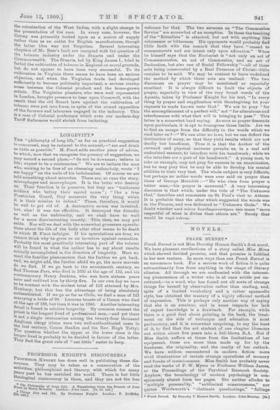LONGEVITY.*
Tina "philosophy of long life," as far as practical suggestion lB concerned, may be reduced to the counsel,—" eat and drink as little as possible." M. Finot adds another piece of advice, to which, now that we recognise the potency of suggestion, we may accord a second place,—" do not be downcast; believe in life; expect to be a centenarian." We are to imitate the man who, seeking to be free of an obsessing melancholy, wrote "1 a In happy" on the walls of his bedchamber. Of course we are told something about microbes. There are, so runs the story, mierophages and macrophages. It is the latter who destroy Their function is to preserve, but they are "traitorous Soldiers who betray their sacred cause" ; "like a true Praetorian Guard, they massacre the very thing which It is their mission to defend." These, therefore, it would be well to get rid of. A destructive serum was invented, but, alas! it was too effective. It destroyed the friendly as well as the unfriendly, and we shall have to wait for a more discriminating remedy. This, then, we may put *Bide. Nor will we deal with the somewhat gruesome specula- tions about the life of the body after what seems to be death in which M. Finot indulges. If his speculations are true, we cannot think why he gives us an invective against cremation. Probably the most practically interesting part of the volume Will be found in what the author has to say about results actually accomplished in the direction of longevity. Here we meet the familiar phenomenon that the further we get back, and, we might add, the further afield we go, the more marvels do we find. If we go back to the seventeenth century, we find Thomas Parr, who died in 1635 at the age of 152, and his contemporary Henry Jenkins, who was born sixteen years later and outlived him by thirty-five. In our own day we have to be content with the modest total of 112 attained by Mrs. Iianbum but this has the advantage of being absolutely authenticated. If we go as far as Chile, we find a man of 121 marrying a bride of 98. Lucerne boasts of a Canon who died
at the age of 186, but then it was in 1846. Another interesting detail is found in relative longevity. By common consent the Priest is the longest lived of professional men,—and yet there Is not a single centenarian among the twenty-four thousand Anglican clergy (there were two well-authenticated cases in
the last century, Canon Beadon and the Rev. Hugh Totty). The question whether the upper or the lower class is the nger lived is probably to be decided in favour of the latter. They find the great rule of "eat little" easier to keep.










































 Previous page
Previous page